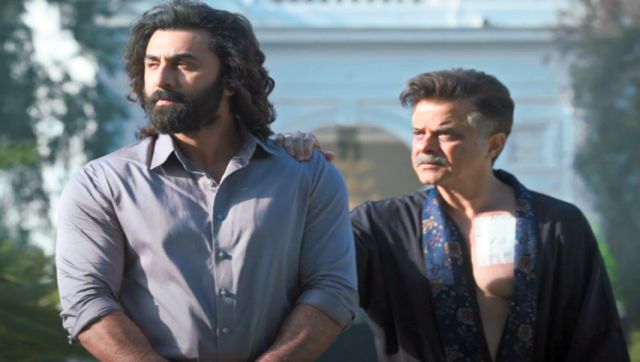If you are wondering what movie to watch next at the big screens, many would recommend Sandeep Reddy Vanga-directed and Ranbir-Kapoor-starrer Animal. In fact, the movie has raked in quite a lot of moolah – trade analysts peg that the film has already crossed the Rs 350-crore mark globally in the three days since it has been released. Notably, if you are one of those who refer to
reviews before making a decision, you will notice that several of the critiques of the Ranbir Kapoor movie will mention ‘daddy issues’. For instance, one movie portal headlined its review as ‘Animal’ review – Psychopath drama glamourises daddy issues. Even the critically-acclaimed Vanity Fair in its critique of its movie writes, “This sporadically fun but exhausting hot mess provides 202 minutes of hyperventilating overkill for star Ranbir Kapoor as a tycoon’s favourite son whose anger-management (as well as daddy) issues are off the charts.” Other movie experts have even gone on to add that Ranbir Kapoor’s filmography has a recurring pattern: of him playing characters with ‘daddy issues’. So, as ‘daddy issues’ becomes a part of our daily conversations and water cooler talks, let’s take a closer look at what it is and how the Kapoor kid plays the character with ‘daddy issues’ with style. Daddy issues, explained ‘She/He has daddy issues’ – is a phrase we may have come across before Ranbir Kapoor’s act in the movie Animal. But what does it exactly mean? Having daddy issues isn’t a psychological condition, as it is more of a cultural phenomenon. The term is used to describe men or women having a complex relationship with their father, which further manifests into complex and unhealthy relationships with other men in their lives. Bre Haizlip, LPC, a licensed mental health counsellor and family relationship expert simply explains it as psychological issues that a person may experience as a result of an absent, abusive, or problematic relationship with their father or father figure. Those who struggle with this issue often have difficulty in handling other relationships, and look for constant approval and validation from others. It is most typically used for women, who struggle with dating and interpersonal relationships due to their own complex relationship with their fathers. In TV and pop culture, characters with “daddy issues” tend to have complicated, dysfunctional relationships with men, and they often appear reckless, needy, or unstable in some way. [caption id=“attachment_13464182” align=“alignnone” width=“640”] While ‘daddy issues’ isn’t a clinical term in the realm of psychology, it is part of the psychology lexicon. Image used for representational purposes/Pixabay[/caption] While ‘daddy issues’ isn’t a clinical term in the realm of psychology, it is part of the psychology lexicon, says clinical psychologist Carla Marie Manly, Ph.D, to mindbodygreen.com. Many psychologists believe that the foundation stone for ‘daddy issues’ was laid down by noted psychologist Sigmund Freud with his notion of a father complex, which describes how a male’s relationship with his father could impact his adult relationships is likely related. Over the years, “father complex” has been used on and off to describe the impact that a physically or emotionally absent father can have on the lives and relationships of both men and women. Interestingly, ‘daddy issues’ has been mainly applied to women and feminine people. As The Print writes, “Somewhere down the pop psychology route, ‘daddy issues’ have come to be associated exclusively with women. Now, daddy issues are often used colloquially to describe women looking for a dominant, macho, masculine partner.” Many psychologists also have issues with the term ‘daddy issues’. They argue that the phrase is often used as a way to minimise females’ attachment needs.” Moreover, they say that the term isn’t gender-specific. Raffaello Antonino, PhD, a London-based counselling psychologist and clinical director at Therapy Central, told mindbodygreen.com, “A man (may) experience daddy issues well into his 30s or 40s if they grew up with an unstable father figure that made them feel ‘not good enough’ for their love and attention as a child. In turn, their ‘daddy issues’ might make them insecure in their romantic relationships (or have) difficulties navigating relationships with powerful men in their lives, like a manager at work.” ‘Daddy issues’ in pop culture ‘Daddy issues’ have become a huge part of pop culture and has even become a part of our language, especially among teens and young adults. In fact, daddy issues have long been entertaining the public – be it in Lolita or as recently as Animal. There are songs, movies, and literature peppered with instances of ‘daddy issues’. In fact, years ago, Sylvia Plath wrote a poem titled Daddy. There’s also the song titled ‘Daddy Issues’ by Lana Del Ray. In last year’s Netflix film, Blonde, Ana De Armas depicts a Marilyn Monroe whose whole life is haunted by the vacuum of a father she never knew. [caption id=“attachment_13464262” align=“alignnone” width=“640”]
 In several of his movies, Ranbir Kapoor has played characters having ‘daddy issues’. One such example was Wake up Sid in 2009.[/caption] At home too, there have been several instances of characters in movies having daddy issues. There’s the ever-popular Kabhi Khushi Kabhi Gham, Udaan, and even Taare Zameen Par in which the protagonists deal with ‘daddy issues’. And if there was an award to be handed out for the actor playing the most number of characters with ‘daddy issues’ it would definitely go to none other than Ranbir Kapoor himself. He has repeatedly depicted daddy issues in movies such as Wake up Sid, Ajab Prem Ki Ghazab Kahani, Yeh Jawaani Hai Deewani and even Sanju. In his newly-released movie Animal too, he struggles with ‘daddy issues’. Some experts note that its poor portrayal in movies and television actually do more harm than good. And that it’s time that ‘daddy issues’ are not just a term that we lightheartedly throw at one another. But recognise that it is a deep-rooted problem that needs assistance and may require professional help. With inputs from agencies
In several of his movies, Ranbir Kapoor has played characters having ‘daddy issues’. One such example was Wake up Sid in 2009.[/caption] At home too, there have been several instances of characters in movies having daddy issues. There’s the ever-popular Kabhi Khushi Kabhi Gham, Udaan, and even Taare Zameen Par in which the protagonists deal with ‘daddy issues’. And if there was an award to be handed out for the actor playing the most number of characters with ‘daddy issues’ it would definitely go to none other than Ranbir Kapoor himself. He has repeatedly depicted daddy issues in movies such as Wake up Sid, Ajab Prem Ki Ghazab Kahani, Yeh Jawaani Hai Deewani and even Sanju. In his newly-released movie Animal too, he struggles with ‘daddy issues’. Some experts note that its poor portrayal in movies and television actually do more harm than good. And that it’s time that ‘daddy issues’ are not just a term that we lightheartedly throw at one another. But recognise that it is a deep-rooted problem that needs assistance and may require professional help. With inputs from agencies
Multiple reviews of the Ranbir Kapoor movie ‘Animal’ state that the actor plays a character with ‘daddy issues’ quite convincingly. But what are daddy issues? Are they a psychological condition? And how do they affect people’s lives?
Advertisement
End of Article


)

)
)
)
)
)
)
)
)



